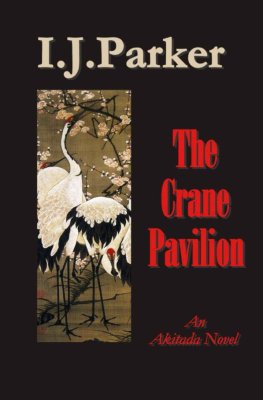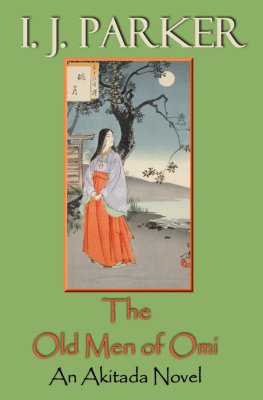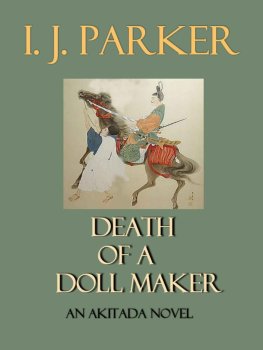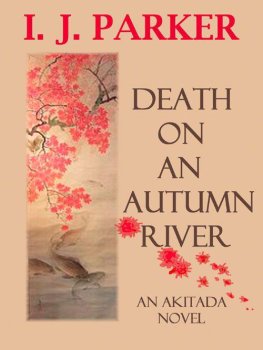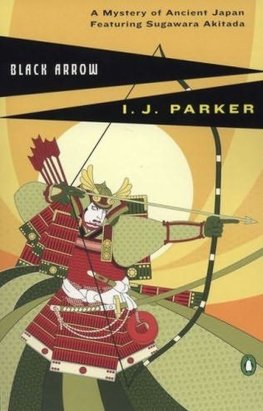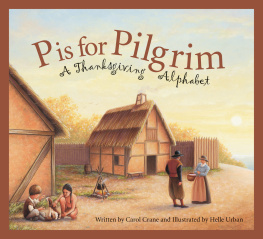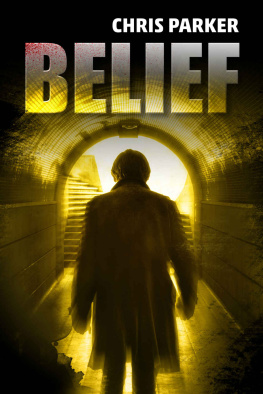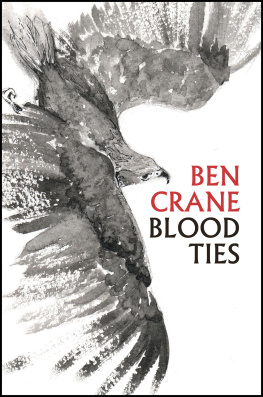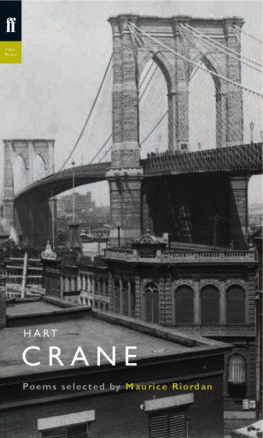I. Parker - The Crane Pavillion
Here you can read online I. Parker - The Crane Pavillion full text of the book (entire story) in english for free. Download pdf and epub, get meaning, cover and reviews about this ebook. genre: Detective and thriller. Description of the work, (preface) as well as reviews are available. Best literature library LitArk.com created for fans of good reading and offers a wide selection of genres:
Romance novel
Science fiction
Adventure
Detective
Science
History
Home and family
Prose
Art
Politics
Computer
Non-fiction
Religion
Business
Children
Humor
Choose a favorite category and find really read worthwhile books. Enjoy immersion in the world of imagination, feel the emotions of the characters or learn something new for yourself, make an fascinating discovery.
- Book:The Crane Pavillion
- Author:
- Genre:
- Rating:5 / 5
- Favourites:Add to favourites
- Your mark:
- 100
- 1
- 2
- 3
- 4
- 5
The Crane Pavillion: summary, description and annotation
We offer to read an annotation, description, summary or preface (depends on what the author of the book "The Crane Pavillion" wrote himself). If you haven't found the necessary information about the book — write in the comments, we will try to find it.
The Crane Pavillion — read online for free the complete book (whole text) full work
Below is the text of the book, divided by pages. System saving the place of the last page read, allows you to conveniently read the book "The Crane Pavillion" online for free, without having to search again every time where you left off. Put a bookmark, and you can go to the page where you finished reading at any time.
Font size:
Interval:
Bookmark:
I. J. Parker
The Crane Pavillion
1
Koshiro finished his bowl of rice gruel and set it down beside him. With a sigh of satisfaction, he looked across his garden where the cabbage, radish, and melon plants grew daily larger. The morning sun was quite warm already. It was autumn already, a time of clear skies and chills bringing the promise of winter. Then maybe he would hate his lonely life again, but just now, in this glorious morning sun, surrounded by birdsong and the scent of the rose bush, living in this small wooden house felt like a gift from the gods.
Peace.
Refuge.
And a new life.
He closed his eyes and leaned back against the sun-warmed boards. In a moment he would get up, wash his bowl, and start his chores. They were light, though the grounds were large. The owner hired workers for repairs and heavy work. Yes, Koshiro was blessed to have found this place.
And so were the others. He smiled. The student, the most recent arrival, still shied like a rabbit whenever they met. And he still feared every new arrival. But he was the only one. The professor was deaf, and the nun never paid attention. And the lady? Sometimes when there was a knocking, she got that look of longing on her face-as if she expected a lover to come and carry her away.
Koshiro hated that look. She was very beautiful, and it was to be expected that she should have known love and still wished for it. But she was here, as they all were. None of them would ever leave.
They would find consolation.
In time. Because time was all they had.
And each other.
He imagined himself and the lady becoming reconciled to their lives and to each other and smiled. There was hope. There always was hope.
And then he heard the childrens cries.
His eyes popped open. He looked in the direction of the sound but saw nothing beyond the lush green trees and shrubs where late shrubs still bloomed in shades of red. Getting to his feet, he shaded his eyes. It was quiet again. He decided the children had been at some silly game and relaxed again. They made a nuisance of themselves, but the lady loved children. He gave a low growl of irritation.
Picking up his bowl, he decided that today he must put his foot down and tell them to stop coming into the garden. When he straightened up, he saw them. Two small figures had burst from the trees, waving their arms and shouting.
Now what? They knew better than to bother him. He had let them know they werent welcome. He set the bowl back down, put on his most ferocious scowl, and started toward them.
The boy and girl were nine and ten respectively, the children of a woman who lived in the poor quarter across from the Takashina mansion. She was a widow who cleaned other peoples houses all day long. Ragged, thin, and left to their own resources, the children had climbed the wall and come into the garden to play. They reminded him of his own childhood, and he had been too permissive in the beginning. But his duties here meant that he was to guard the property against undesirable visitors, and it was only a matter of time before the professor or the nun would object to the noise of children and complain to the owner.
They were shouting Come quick! and The poor lady! Koshiro began to feel queasy and started to run
When they met, the children were babbling, their eyes wide with panic, and their arms flailing, pointing, gesturing. Something was wrong, though he could not make out what it was.
Lady Ogata occupied the Lake Pavilion, a graceful building overlooking a small artificial pond with koi and water lilies. Though she was noble and in her mid-twenties, Koshiro never thought of her without feeling desire. He himself was fifty years old and already had gray hairs among the black ones. But lust did not die with age, and a man had little control over his willful thoughts.
So Koshiro ran through the trees and bounded up the veranda steps of the Lake Pavilion. All was still. The shutters were closed except for one that stood partially open. He called out, My lady? Are you all right? Its Koshiro.
There was no answer.
He pushed the shutter a little wider and looked inside.
The large, elegant room lay in deep shadow after the brightness outside. At first, he thought it was empty, its bare floor gleaming softly.
Puzzled, he blinked his eyes to adjust them. The little girl had caught up and was shaking his arm. Look! she cried. Please take her down! Quick!
He raised his eyes from the floor.
Something floated in the dim space, a dusky shape. A bundle of robes hung up to air? The silk gowns almost touched the floorboards and moved softly in the breeze from the open doorway. As he stared, the shape seemed to turn slightly toward him, and he saw a pair white-stockinged feet. They did not touch the floor.
In wonder, he stepped inside and went closer. That was when he realized that a woman was inside the robes. She was weightless, floating above the ground like one of the fairies in the western paradise.
He looked up, saw her face, and recoiled. It was Lady Ogata, but all of her beauty was gone. She looked shocking, her tongue protruding from her mouth like some huge slug, and her eyes rolled back so only the whites showed. Purple silk was looped around her neck and passed behind her head. It was tied around one of the rafters above. He muttered a prayer and reached for his amulet.
Lady Ogata hung, swaying and turning gently, while the little girl cried something and pulled at him. Swallowing down his nausea, Koshiro went to touch the limp hand. It was cold as ice.
Too late, he croaked, then turned away to run outside and vomit up his rice gruel.
So quickly can a mans fortune turn from happiness to despair. All was lost. Nothing would ever be well again.
At that moment, Koshiro hated Lady Ogata as he had never hated anyone before.
2
Less than a mile from the site of Lady Ogatas death, Tora also sat in the sunshine on his small veranda. He, too, had eaten his morning gruel and contemplated the day ahead. Behind him, he could hear the voices of his wife Hanae and son Yuki. He, too, felt a sense of contentment.
But unlike Koshiro, Tora was fully aware that not all was well. It was autumn again, and they were home, and there were the shouts and laughter of children again, but the gloom of death hung heavy over this house.
The master had returned, a shadow of his former self, to his motherless children.
Lady Tamako had died in childbirth in the spring while her husband served as governor in distant Kyushu. Tora and Saburo had been with him, and they had feared for his sanity when he learned what had happened, knowing that his lady had been dead and buried weeks before he got the news and that it would be more weeks before he would set foot in his house again.
Tora got up and went inside where Hanae was putting away the bedding and tidying their main room. She was small and agile, his pretty Hanae, a former dancer and still as graceful and desirable as when they had first met. These days there was a new fear in his heart that he might give her a child again and she might die like Lady Tamako. After his return, he had hesitated to take her in his arms and make love to her, and she had wept until he explained. Now, they lay together again, but still he was afraid. All their lives had changed.
Yuki put his head in. I put the firewood next to the fireplace, Mother, he announced. When he saw his father, his eyes lit up. Will you give me another stick fighting lesson today, Father?
Tora was proud of his sturdy son, but the mention of stick fighting reminded him of his master. He had taught Lord Sugawara the moves and strategies of combat with a fighting stick many years ago when they had both been young and full of energy and laughter. Oh, how sadly things had changed!
Font size:
Interval:
Bookmark:
Similar books «The Crane Pavillion»
Look at similar books to The Crane Pavillion. We have selected literature similar in name and meaning in the hope of providing readers with more options to find new, interesting, not yet read works.
Discussion, reviews of the book The Crane Pavillion and just readers' own opinions. Leave your comments, write what you think about the work, its meaning or the main characters. Specify what exactly you liked and what you didn't like, and why you think so.

